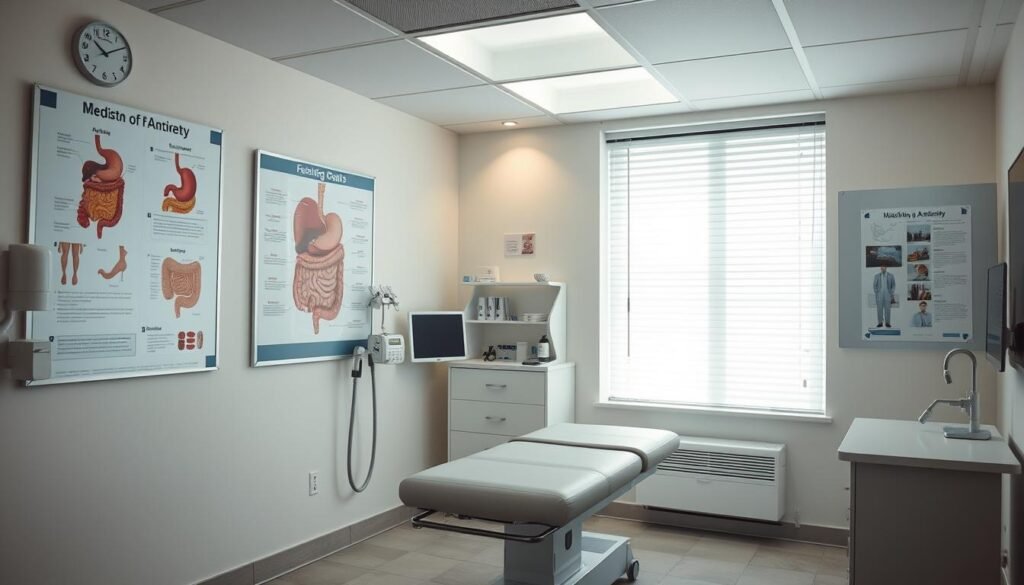Did you know people with irritable bowel syndrome (IBS) often miss more work? They are absent three times as much as others without these symptoms. This fact highlights how bowel issues tied to anxiety can disrupt daily life. Stress can lead to stomach problems, showing the link between our minds and digestive health is important.
This guide looks closely at bowel anxiety symptoms. It details the connection between anxiety and how well our stomachs work. If you are dealing with these problems, knowing the symptoms is the first step. It helps in managing them better and living a happier life.
Key Takeaways
- Chronic gastrointestinal symptoms are often linked to anxiety disorders.
- Stress can significantly alter gut motility and digestive processes.
- Mindful eating is beneficial in managing stress and improving digestive health.
- Irritable bowel syndrome is more prevalent in women, particularly under 50.
- Frequent GI symptoms may indicate an underlying condition requiring attention.
- A poor quality of life is commonly reported by those suffering from moderate to severe IBS.
Introduction to Bowel Anxiety Symptoms
Bowel anxiety symptoms can come from stress, upsetting many people’s stomachs. This link between our nerves and guts is strong, especially with Irritable Bowel Syndrome (IBS). Studies show 5% to 10% of people have IBS. Those with IBS are three times more likely to be anxious or depressed.
These symptoms can vary, like changes in how often you go or feeling more stressed about your stomach. This shows why knowing about anxiety-related bowel issues is key. They are not just physical problems. They reflect our mental health too. Watching these symptoms carefully is important. People should note changes and talk with their doctors.
Handling bowel anxiety means understanding the stress-digestion link. Chronic stress and worry can start or worsen gut problems. Finding ways to cope is essential. This might mean exercising, practicing mindfulness, or getting therapy. Trying the right treatments can ease the pain of these linked issues.
The Gut-Brain Connection
The gut-brain connection shows how our feelings impact digestion. Anxiety can change how fast our stomach works, causing symptoms like diarrhea or constipation. The gut has over 500 million neurons, creating a big network that talks to the brain.
This chat happens through the vagus nerve, which helps send signals back and forth. This interaction makes a loop that shows how our mind affects our digestion.
How Anxiety Impacts Digestion
Anxiety affects our digestion, leading to issues like stomach upsets and changes in how much we want to eat. Stress messes with our digestion, showing up as indigestion or stomach cramps. There’s a link between digestive problems, like irritable bowel syndrome (IBS), and mental health issues.
Research shows that long-term stress can mess up how our stomach works. Getting help for both mental and gut health is key to feeling better.
Visceral Hypersensitivity Explained
Visceral hypersensitivity means our gut overreacts, causing extra discomfort from regular digestion activities. This condition makes people feel more pain and can change how hungry they feel. It shows the strong link between our gut and brain.
Studies say gut health really affects our mood and thinking. Eating foods high in fiber and omega-3s helps our gut and mood.
Common Bowel Anxiety Symptoms
Bowel anxiety symptoms show up in many ways, affecting both mind and body together. Knowing these signs helps people realize what they’re going through and get the help they need. Spotting the physical signs of bowel anxiety is key to handling it well.
Identifying Physical Signs
When we’re anxious, our bodies react. Here are some common physical responses:
- Diarrhea or constipation: Anxiety changes how fast we digest, causing these issues.
- Gas and bloating: Anxiety can slow digestion, making gas build up.
- Abdominal pain and cramping: These pains are common with bowel anxiety.
- Discolored stool: Stress can change stool color, like making it yellow or black. It shows digestion is too fast.
Psychological Signs Linked to Bowel Anxiety
Anxiety’s mental effects are strong, often making physical symptoms worse. People might feel:
- A feeling of urgency: The need to find a bathroom quickly comes from stress.
- Panic and worry: Worrying about bowel movements can make anxiety worse.
- Sleep disturbances: Not sleeping well because of anxiety can lead to bowel problems.
This mix of physical and mental signs creates a cycle of stress. It’s important to find ways to cope effectively.
| Physical Symptoms | Psychological Symptoms |
|---|---|
| Diarrhea or constipation | Panic and worry |
| Gas and bloating | Urgency to use the bathroom |
| Abdominal pain and cramping | Sleep disturbances |
| Discolored stool | Heightened anxiety levels |
Irritable Bowel Syndrome (IBS) and Anxiety
Understanding the link between irritable bowel syndrome and mental health is crucial. Many with IBS deal with abdominal pain, bloating, and irregular movements. Knowing how IBS affects daily life highlights the need to address psychological health too.
Overview of IBS Symptoms
Those with IBS report a range of symptoms. They include:
- Abdominal pain and cramping
- Diarrhea or constipation
- Bloating and excessive gas
- Urgent need to have a bowel movement
- Changes in bowel habits
The quality of life can be greatly affected, pushing many to seek help. Research shows up to a third of IBS patients also have anxiety or depression. This underscores the importance of handling both the physical and mental aspects.
Correlation Between IBS and Anxiety Disorders
A strong link between IBS and anxiety disorder exists. Research involving over 1.2 million hospitalizations noted a 38.1% anxiety occurrence in these patients. IBS and anxiety can worsen each other, making a vicious cycle.
To manage both conditions, techniques like muscle relaxation and deep breathing are useful. Meditation and good sleep also provide long-term benefits. Doctors may suggest medicines for IBS symptoms and therapy for anxiety. For more insights, see the University of Missouri Study.

Understanding the Psychological Impact on Bowels
Our emotions and bowel health are deeply linked. Conditions like irritable bowel syndrome (IBS) show how our feelings impact our bowels. Around 11.2% of people worldwide are affected by IBS. This condition often comes with symptoms sparked by anxiety.
These symptoms create a cycle where emotional issues and digestive problems feed into each other. Research shows that 40% to 80% of IBS sufferers also face mental health challenges. Anxiety and depression are especially common among them.
Emotions can change our body’s responses. Stress and worry can make our gut more sensitive, causing discomfort. People with IBS usually report these problems. This highlights the importance of treating both mind and body for better health.
Understanding the psychological impact on bowels can help us take action. We can improve our gut health and emotional state with the right approaches. Practices like mindful eating, staying active, and using probiotics are beneficial. They help strengthen the connection between our gut and brain.
Diagnosing Bowel Anxiety Symptoms
Healthcare providers play a key role in diagnosing bowel anxiety symptoms. They begin by talking with the patient in detail. This helps them understand how stress affects the person’s gut health.
Knowing the link between emotions and digestive problems is important. It’s a critical step in finding the right treatment.
Consulting Healthcare Providers
Seeing a healthcare provider is crucial when facing symptoms of bowel anxiety. They gather information about the patient’s bowel health and mental wellbeing. This info paves the way to figure out the next steps.
Patients might be asked about how often they have symptoms. They’re also asked about what makes their anxiety worse. Family health history is important, too.
- Severity and frequency of symptoms
- Triggers related to anxiety and stress
- Family medical history
Tests and Assessments for IBS and Anxiety
To find out what’s causing bowel anxiety symptoms, various tests are done. These include:
| Test Type | Description |
|---|---|
| Physical Exam | A hands-on assessment to check for abdominal tenderness or abnormalities. |
| Blood Tests | To identify signs of infection, inflammation, or other underlying conditions. |
| Stool Tests | Checking for blood, pathogens, or signs of malabsorption. |
| Imaging Studies | Ultrasounds or CT scans may detect obstructions or abnormalities in the intestines. |
| Psychological Assessment | Evaluating mental health to identify anxiety disorders or emotional stressors. |
Identifying both physical and mental factors is key to treating bowel anxiety. Early detection and action improve lives. Getting the right help makes a big difference in health and happiness.

Coping with Bowel Anxiety
Making small changes in your daily life can help with bowel anxiety. Creating a healthy environment supports both your mind and body. This leads to less discomfort from gastrointestinal issues. Doing exercises regularly and practicing mindfulness lowers stress, which helps your gut and health.
Effective Lifestyle Changes
Making some lifestyle changes can greatly help those with bowel anxiety. Here’s what you can do:
- Regular exercises like walking or yoga reduce stress.
- Practice mindfulness, such as meditating and deep-breathing exercises.
- Keep a regular sleep schedule for better rest.
- Avoid caffeine, alcohol, and processed foods that worsen symptoms.
Dietary Adjustments for Better Gut Health
What you eat is very important for dealing with bowel anxiety. Eating certain foods can bring comfort to your digestive system. Foods to consider include:
- Grains that are gluten-free avoid irritation.
- Brassicas, like broccoli and kale, which are full of nutrients for your gut.
- Olive oil, which helps reduce inflammation.
- Foods rich in probiotics, such as yogurt and kefir, to improve gut flora.
A diet that limits high-FODMAP foods can really help with symptoms. It shows how closely diet and digestive health are linked. Looking into dietary changes can also aid in managing bowel anxiety.
Mindfulness and Stress Reduction Techniques
Mindfulness practices can really boost your bowel health when added to your daily life. Stress reduction methods, like mindful eating and meditation, let people tune into what their body needs. This leads to better digestion and less stomach upset.
Mindfulness for Bowel Health
Mindfulness is getting more recognition for its benefits on bowel health, especially for those with irritable bowel syndrome (IBS). Research shows that mindfulness meditation lowers stress and anxiety, which are big causes of IBS flare-ups. Practices like focused breathing and eating attentively help people listen to their body, leading to healthier digestion.
Relaxation Exercises and Their Benefits
Adding relaxation exercises to your daily life can really help if you have anxiety-related bowel issues. Some common methods are:
- Deep Breathing: A simple way to reduce stress and help your nervous system relax.
- Progressive Muscle Relaxation: It involves tightening and then relaxing different muscle groups to relax your whole body.
- Yoga: This mixes physical activity with mindfulness, helping to keep your bowel functions regular.
Doing these stress reduction exercises regularly not only lowers anxiety, but it also improves your bowel health. They make the connection between your gut and brain more balanced. This leads to a better life quality for those with bowel issues related to anxiety.
| Technique | Description | Benefit for Bowel Health |
|---|---|---|
| Mindful Eating | Focusing on the experience of eating, savoring each bite. | Enhances digestion and may reduce overeating. |
| Deep Breathing | Consistent inhaling and exhaling to promote calmness. | Reduces stress hormones that exacerbate IBS symptoms. |
| Progressive Muscle Relaxation | Systematically tensing and relaxing muscle groups. | Alleviates physical tension that can affect bowel function. |
| Yoga | Combines physical poses with focused breathing. | Improves gut motility and reduces discomfort. |

Therapeutic Approaches for Managing Bowel Anxiety
Dealing with bowel anxiety takes a mix of therapies that help both the body and mind. Treatments like cognitive behavioral therapy for IBS and hypnotherapy work well for overcoming these challenges.
Cognitive Behavioral Therapy for IBS
Cognitive behavioral therapy (CBT) changes negative thoughts and actions linked to gut issues. Most people need 5 to 10 sessions for the best results. Places like the Taubman Health Center and Michigan Medicine’s GI Behavioral Health Program offer these specialized services.
- Proven effectiveness in managing IBS symptoms
- Improved emotional responses to bowel-related distress
- Enhancement of overall quality of life
Alternative Therapies: Hypnotherapy and Biofeedback
Hypnotherapy is gaining popularity as a treatment for IBS. About 80% of IBS patients see benefits from gut-directed hypnotherapy. It helps them control how they react to bowel anxiety physically and emotionally. Teaming it with biofeedback and acupuncture can help even more.
| Therapy Type | Key Benefits | Typical Duration |
|---|---|---|
| Cognitive Behavioral Therapy | Addresses negative thought patterns, improves emotional regulation | 5 to 10 sessions |
| Hypnotherapy | Provides control over physiological responses, effective for IBS | Varies based on individual needs |
| Biofeedback | Improves awareness of bodily functions, promotes relaxation | Varies |
| Acupuncture | Helps manage anxiety and related symptoms | Varies |
Adding these therapies to treatment plans can make a big difference for those with bowel anxiety. They improve symptoms and overall health.
Conclusion
It’s key to understand bowel anxiety if you have irritable bowel syndrome (IBS) and mental health issues. Knowing the link between your mind and body is critical. Studies show that 80% of people with IBS also deal with mental health problems.
To handle anxiety-related bowel problems, changing your lifestyle and diet helps. Also, therapy might be needed. Because anxiety and IBS symptoms often overlap, focusing on the gut-brain link is essential.
Adding mindfulness and relaxation to your daily life can improve your gut’s health. At the same time, it can reduce stress and anxiety. By knowing this connection, we can approach bowel anxiety symptoms in a complete way. This leads to better health and function for those dealing with these issues.